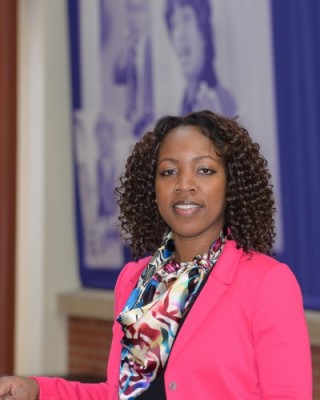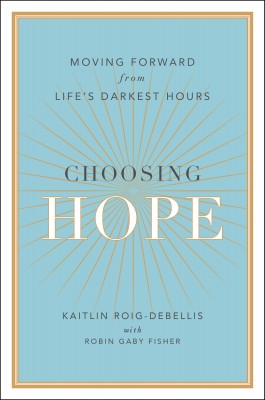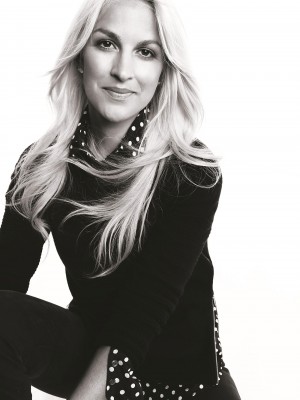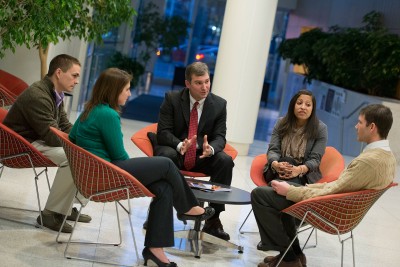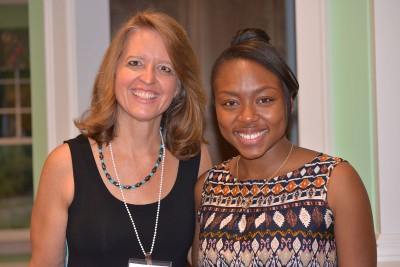Now in the midst of recruiting its second cohort, the Dean’s Doctoral Scholar Program at UConn’s Neag School of Education provides full tuition for four years plus a stipend to promising Ph.D. candidates. Dean’s Doctoral Scholars have the opportunity to conduct interdisciplinary research with leading experts in the field of education while earning a doctoral degree from UConn in curriculum and instruction, educational leadership, or educational psychology.
This fall, the Neag School is joined by the first group of Dean’s Doctoral Scholars selected from across the country – from Puerto Rico to New Orleans to New York – with such diverse interests as neuropsychology research and multicultural education.
Here, Spotlight offers a brief introduction to each member of the inaugural class:
For more information about the Dean’s Doctoral Scholars Program and the application process, visit s.uconn.edu/neagdds.
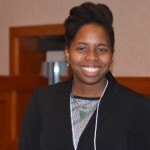
Name: Nneka Arinze
Hometown: Atlanta
Your Career Previous to Arriving at UConn: Youth worker
Your Ph.D. Area of Study: Educational Leadership – Sport Management
Proudest Career Moment: Hearing children echo to others what they’ve learned with me
Ultimate Career Goal: To directly or indirectly make a difference in someone’s life using sports
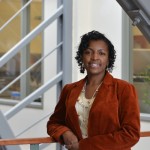 Name: Latanya Brandon
Name: Latanya Brandon
Hometown: Bridgeport, Conn.
Your Career Previous to Arriving at UConn: New York City public school teacher
Your Ph.D. Area of Study: Curriculum and Instruction in Science Education
Proudest Career Moment: Becoming a Dean’s Doctoral Scholar
Ultimate Career Goal: To investigate and report on research that directly impacts the science classroom
Favorite Dairy Bar Ice Cream Flavor: I haven’t tried it yet!
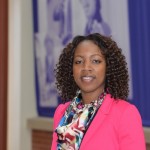 Name: Sian Charles-Harris
Name: Sian Charles-Harris
Hometown: San Fernando, Trinidad and Tobago/Bronx, N.Y.
Your Career Previous to Arriving at UConn: High school English teacher in New York City
Your Ph.D. Area of Study: Curriculum and Instruction
Proudest Career Moment: I still have a special place in my heart for my very first class of sixth-graders as a first-year teacher. They are now juniors in college. I received a message recently from one student, Nathalie, who had the misfortune of struggling through the angst and awkwardness of her sixth-grade year in my first-year classroom. She declared in that message that my class was her absolute favorite class throughout middle and high school and she still remembers some of the great discussions we had based on our readings. I thought, “That’s great! (Because I had no idea what I was doing!)” It’s just good to know that the kids really are all right.
Ultimate Career Goal: To be recognized as having made a relevant and significant contribution to the field of multicultural education through scholarship and practice.
Favorite Dairy Bar Ice Cream Flavor: Coffee
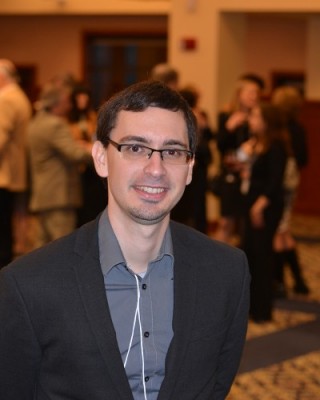 Name: William Estepar-Garcia
Name: William Estepar-Garcia
Hometown: Guaynabo, Puerto Rico
Your Career Previous to Arriving at UConn: Measurement and research specialist at College Board, Puerto Rico and Latin America Office
Your Ph.D. Area of Study: Measurement, Evaluation and Assessment, Department of Educational Psychology
Proudest Career Moment: Being asked to present at a conference in Mexico about a joint research project regarding how to improve the retention of students in a top-tier university in Panamá.
Ultimate Career Goal: To work alongside great colleagues in an organization (nonprofit, academia) that strives to provide research based-information for the improvement of quality of education.
Favorite Dairy Bar Ice Cream Flavor: I haven’t tried them all (yet), but right now the coconut flavor is my favorite!
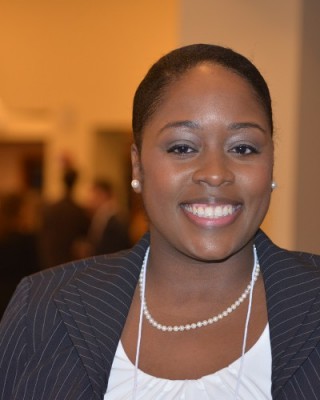 Name: Britney Jones
Name: Britney Jones
Hometown: Elmont, N.Y.
Your Career Previous to Arriving at UConn: Fourth-grade teacher, curriculum fellow (developer)
Your Ph.D. Area of Study: Learning, Leadership and Education Policy Program
Proudest Career Moment: Learning to work with, and differentiate for, students with a variety of needs. I celebrated when 100 percent of my students were proficient on the NYS fourth-grade science state test for the first time in my school’s history (2014). Many celebrations of success with individual students and families also come to mind when I think of proud moments.
Ultimate Career Goal: Holding a position in which I can continue to think critically about education and effect change in systems that affect all students, families, teachers, and administrators (particularly students of color).
Favorite Dairy Bar Ice Cream Flavor: I have not been yet! On my to-do list. Do they have cookies and cream?
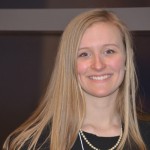 Name: Taylor Koriakin
Name: Taylor Koriakin
Hometown: Sparta, N.J.
Your Career Previous to Arriving at UConn: After graduating from UConn with a BA in psychology in 2011, I accepted a job at the Kennedy Krieger Institute in Baltimore. There, I worked as a research assistant in the department of neuropsychology and coordinated several research studies related to autism, dyslexia, ADHD, and other developmental disabilities.
Your Ph.D. Area of Study: School Psychology
Proudest Career Moment: Getting my first manuscript published in a peer-reviewed journal and also being accepted into the Dean’s Doctoral Scholars Program.
Ultimate Career Goal: To become a licensed psychologist
Favorite Dairy Bar Ice Cream Flavor: Chocolate peanut butter
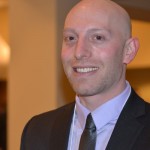 Name: Jeremy Landa
Name: Jeremy Landa
Hometown: Huntington Woods, Mich.
Your Career Previous to Arriving at UConn: High school social studies teacher at Cooperative Arts and Humanities High School in New Haven, Conn.
Your Ph.D. Area of Study: Measurement, Evaluation, and Assessment, Department of Educational Psychology
Proudest Career Moment: Co-teaching a Facing History and Ourselves class with a theater teacher that had a class performance including plays, spoken word pieces, songs, dances, and visual art. All the art related to and was consistent with learning about sociology, psychology, and the history of civil rights in the United States. It was really hard, but satisfying to pull off with my colleague.
Ultimate Career Goal: Complete work somewhere that is applied within K-12 public schools to help make teachers’ lives easier to manage and improve their abilities on the job.
Favorite Dairy Bar Ice Cream Flavor: I am embarrassed to say I have not been there yet. Favorite flavor in general is chocolate-chocolate chip.
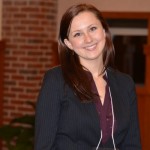 Name: Tiffany Polk
Name: Tiffany Polk
Hometown: New Orleans
Your Career Previous to Arriving at UConn: Test preparation and college readiness specialist
Your Ph.D. Area of Study: School Psychology
Proudest Career Moment: When I found out that the very first student I worked with on test prep and college applications was accepted into college.
Ultimate Career Goal: Not yet decided. I am passionate about research and systems-level change, but I also love working with students in schools. Thus, I am open to seeing where my passions take me!
Favorite Dairy Bar Ice Cream Flavor: Oreo
Take the first step toward becoming a Dean’s Doctoral Scholar: Apply by Dec, 1, 2015. For more information, visit s.uconn.edu/neagdds.









